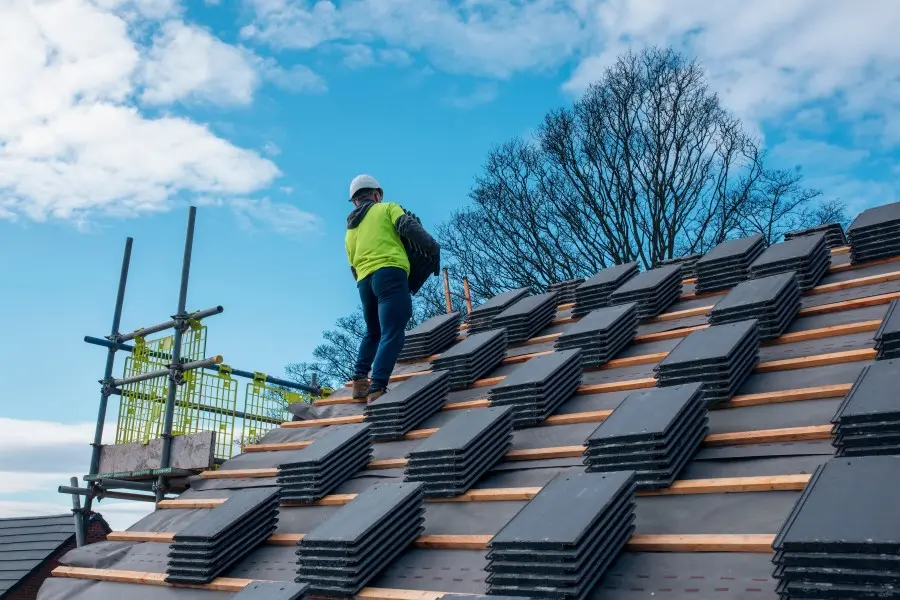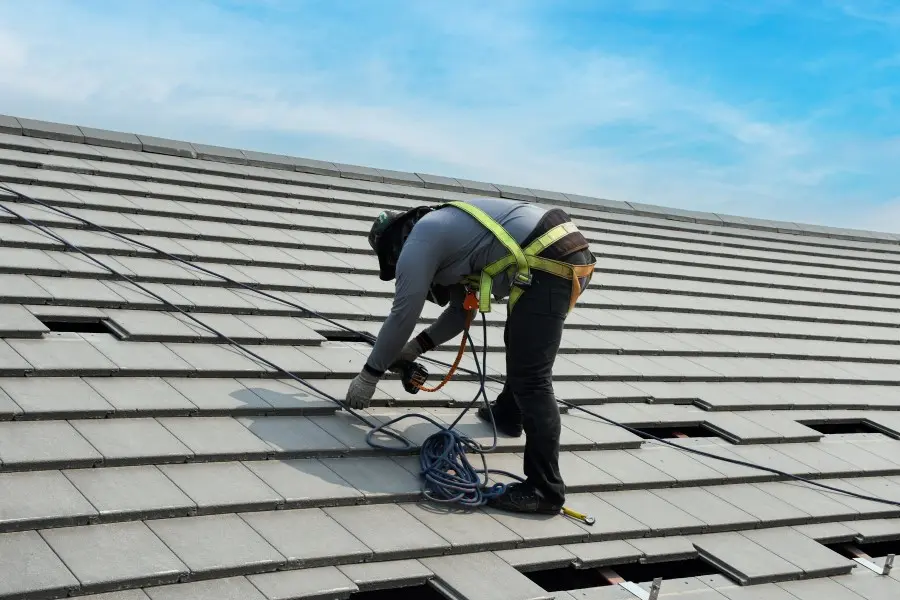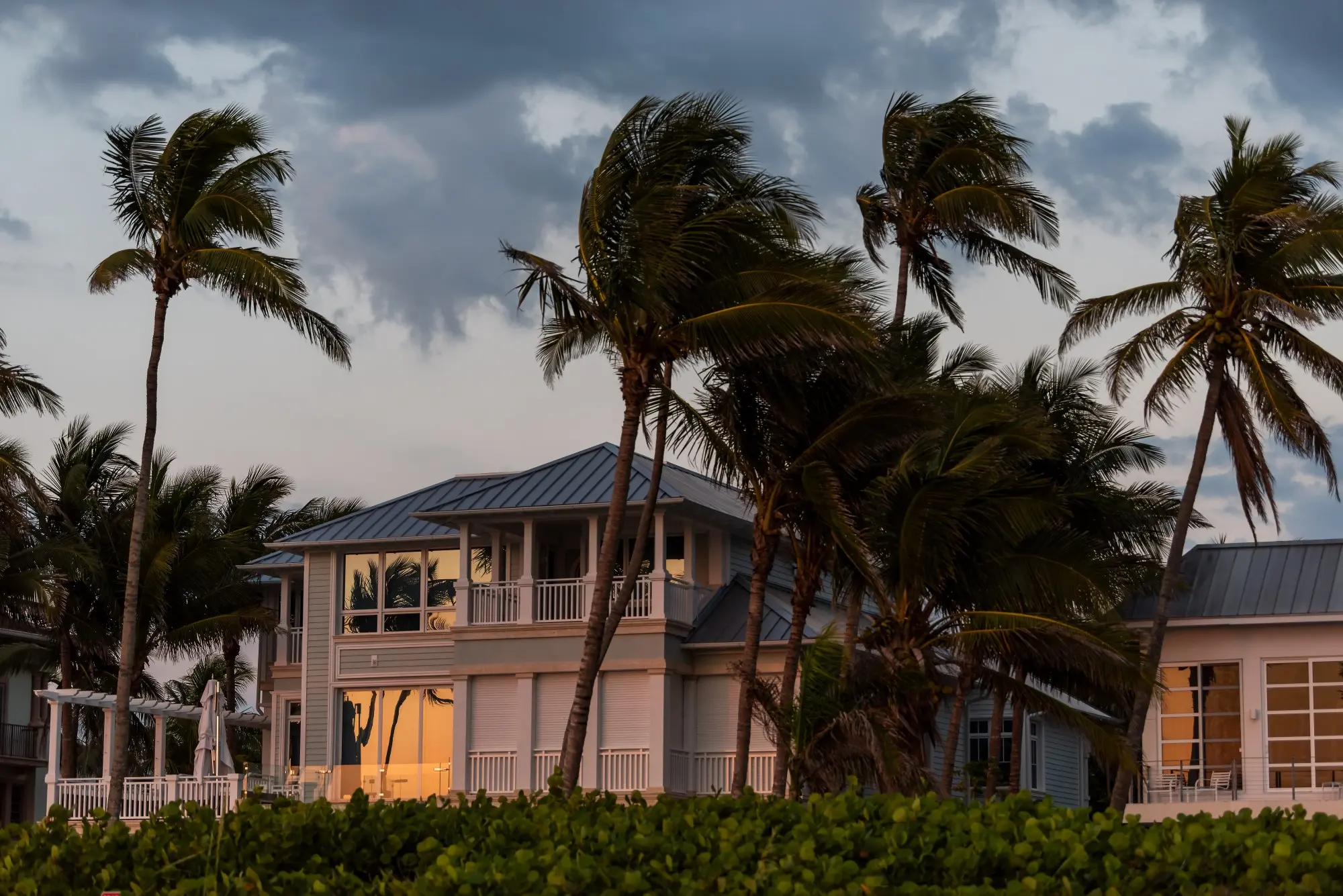Smart Roofing Systems with WiFi Monitoring
WiFi isn’t just for the inside of your home. Smart sensors embedded within roofing systems detect moisture infiltration before visible damage occurs, sending alerts directly to homeowners' phones. These WiFi-connected systems monitor temperature differentials and moisture levels across the roof deck, providing early warning for ice dams that can form within hours during Chicago's rapid temperature swings.
Advanced solar shingles like GAF's Timberline Solar ES 2 generate electricity while functioning as protective roofing material. These energy-generating shingles eliminate the need for bulky panels and qualify for federal tax credits that can offset 30 percent of installation costs. Chicago gets an average of 189 sunny days annually, making solar shingles increasingly viable, especially for south-facing roof sections.
Price range: $500-$1,500 for complete sensor systems.
Advanced solar shingles like GAF Timberline Solar ES 2: $35,000-$40,000 before incentives, with a 30 percent federal tax credit reducing net cost to $25,000-$28,000.
Impact-Resistant Polymer-Modified Shingles
These are polymer-modified asphalt shingles that meet UL 2218 Class 4 standards, the highest rating for impact resistance. These shingles include rubberized polymers that maintain flexibility at -20°F, preventing the brittleness that causes standard shingles to crack during Chicago winters. Insurance companies offer 10-35 percent premium discounts for Class 4-rated roofing.
The composition of these advanced shingles includes rubberized polymers that maintain flexibility even at temperatures below -20°F. This characteristic proves essential during Chicago winters, when standard asphalt shingles become brittle and prone to cracking. The modified asphalt formulation also includes enhanced UV stabilizers that prevent degradation during summer months when roof surface temperatures can exceed 160°F.
Price range: $4.50-$6.00 per square foot installed.
- Total cost for a 2,000-square-foot roof: $9,000-$12,000.
- An additional $50 per 100 square feet over standard shingles.
Composite Roofing Materials
Composite materials from manufacturers like Brava Roof Tile recreate the appearance of slate, cedar shake, and Spanish tile using recycled rubber and plastics. These products weigh 50 percent less than natural materials, but they still meet Chicago's fire resistance requirements and the mandate to remove wood shingles during reroofing.
Spanish barrel tiles are especially advantageous for Chicago's climate. Unlike clay tiles that can crack during freeze-thaw cycles, composite versions maintain structural integrity across temperature extremes. The material's composition includes UV inhibitors that prevent color fading to guarantee a consistent appearance throughout decades of exposure to Midwest weather conditions.
Installation efficiency is another advantage of synthetic materials. Composite tiles are faster to install than natural alternatives, reducing labor costs and minimizing weather-related delays during Chicago's limited construction season. The lighter weight also eliminates the need for structural reinforcement, something that’s often required with natural slate or clay tiles.
Price range: $7.00-$14.00 per square foot installed, totaling $15,000-$26,500 for average roofs.
- Composite slate: $9-$12/sq ft
- Composite shingles: $6-$12/sq ft
- Cedar shake: $6-$18/sq ft
- Spanish tile: $6-$14/sq ft
Cool Roofing Technology
The Chicago building code requires new low-sloped roofs to achieve 0.72 solar reflectance and 0.92 thermal emittance. White thermoplastic membranes and specialized metal systems meet these requirements, while advanced "cool color" pigments allow darker aesthetics with 40 percent less heat absorption than traditional materials.
You might associate cool roofing technology with simple white membranes, but it has evolved. Advanced pigments allow darker colors to achieve high reflectance ratings, giving homeowners more aesthetic options while meeting code requirements. These "cool color" products use infrared-reflective pigments that reduce heat absorption by up to 40 percent compared to traditional dark roofing materials.
- Price range cool roof coatings: $0.75-$1.50 per square foot.
- Single-ply cool membranes (TPO): $4.50-$16.00 per square foot installed, averaging $10,700 for 1,500 sq ft roof.
Self-Healing Thermoplastic Shingles
Thermoplastic shingles repair minor scratches through molecular restructuring when they’re heated by the sun. Laboratory testing confirms these materials maintain restorative properties through hundreds of damage-repair cycles without compromising structural integrity.
This technology is particularly valuable in Chicago, where wind-blown debris and ice accumulation regularly cause surface abrasions. Traditional shingles experiencing similar damage would need immediate repair to prevent water infiltration. Self-healing materials eliminate these minor repair needs and reduce long-term maintenance costs.
Price range: $8.00-$12.00 per square foot installed (based on F-Wave synthetic shingles with self-healing properties). Total cost for 2,000 sq ft roof: $16,000-$24,000.
Green Roof Systems
Chicago's Floor-Area Ratio bonus rewards developers installing green roofs covering 50 percent of the net roof area, or 2,000 square feet. Extensive systems for residential use support drought-resistant vegetation while reducing stormwater runoff by 50-90 percent and heat transfer by 72 percent, according to the National Research Council of Canada.
Price range: $10-$25 per square foot installed. Extensive systems (residential): $10-$15/sq ft. Intensive systems (commercial): $15-$25/sq ft.
Professional Installation Requirements
Chicago mandates licensed contractors with valid Illinois Roofing Contractor licenses for all roofing work. Manufacturer certification programs through GAF, Owens Corning, and CertainTeed provide system warranties covering all components with single-source accountability.
The city's two-layer maximum means most reroofing requires a complete tear-off. This creates opportunities to upgrade decking and install code-required ice barriers extending 24-36 inches inside exterior walls. To better evaluate proposals, you’ll want to understand warranty distinctions.

How to Choose the Right Roofing Product for Your Chicago Home
To select the optimal roofing system, you’ll need to evaluate multiple factors specific to your property and priorities.
Step 1: Assess Your Current Roof Structure
First, determine your roof’s weight capacity. Older homes may need reinforcement for heavier materials. Check the attic ventilation adequacy, and evaluate roof pitch (steeper roofs have more material options). Don’t forget to consider existing damage that might require deck repairs.
Step 2: Define Your Priorities
- Budget-conscious: Impact-resistant shingles offer the best value with insurance savings.
- Energy efficiency: Cool roofing or green systems provide maximum savings.
- Minimal maintenance: Self-healing or composite materials require the least amount of upkeep.
- Environmental impact: Green roofs or recycled composite materials.
- Technology integration: Smart systems for connected home enthusiasts.
- Aesthetic preservation: Composites match historic materials without drawbacks.

Step 3: Calculate the Total Cost of Ownership
Factor in installation cost, expected lifespan, maintenance requirements, energy savings, and insurance discounts. For example, impact-resistant shingles cost $2,000 more initially but save $500 annually on insurance, paying for themselves in 4 years.
Step 4: Verify Local Requirements
Check Chicago building codes for your specific ward, and confirm HOA restrictions on materials or colors. Verify the insurance company's approved products list. Always review the manufacturer’s certification requirements to ensure the warranty is valid.
Step 5: Match the Product to Chicago Climate Challenges
- For ice dam prevention: Smart monitoring systems or metal roofing.
- For hail protection: Class 4 impact-resistant products.
- For temperature extremes: Composite materials with proven freeze-thaw resistance.
- For heavy snow loads: Lighter synthetic materials to offset snow weight.
- For energy efficiency: Cool roofing meeting Chicago's 0.72 reflectance requirement.
A Roofing Investment Analysis for Chicago Properties
Median home prices in Chicago are rising 6.7 percent annually, which justifies premium roofing investments. Labor costs in the Chicago market reflect higher regional rates, with Illinois Prevailing Wage Act requirements applying to public projects.
Federal incentives and utility rebates for energy-efficient products, combined with insurance discounts for impact-resistant materials, improve ROI significantly. For more justification for your investment, the Department of Energy provides current incentive guidance.


.svg)






